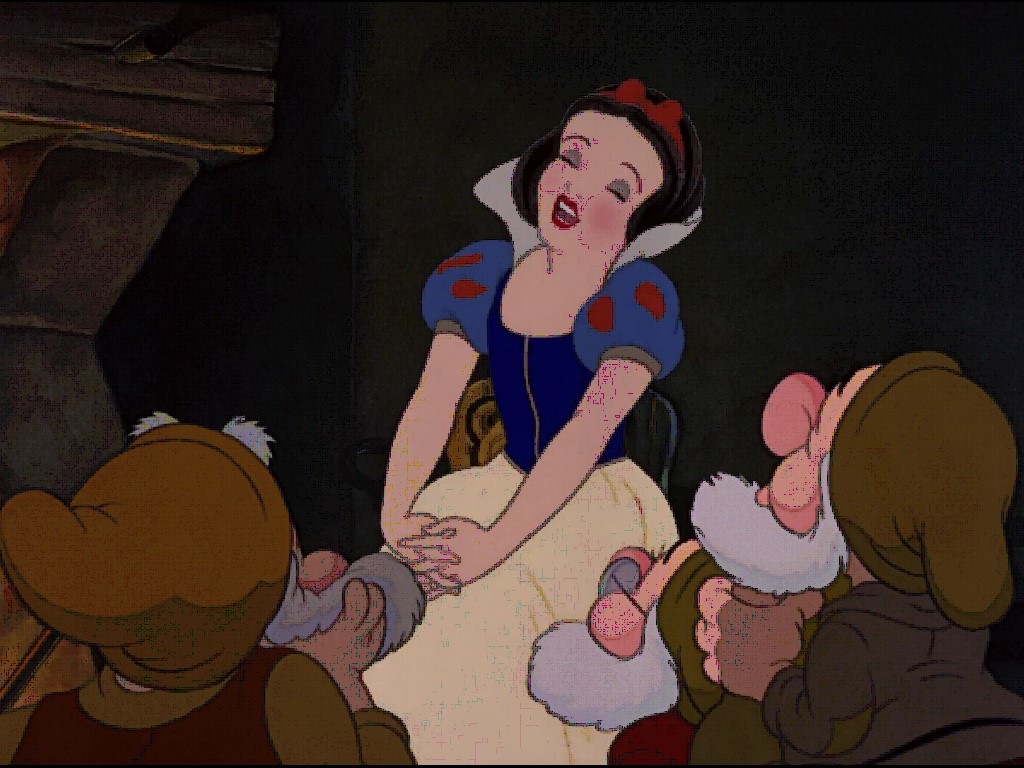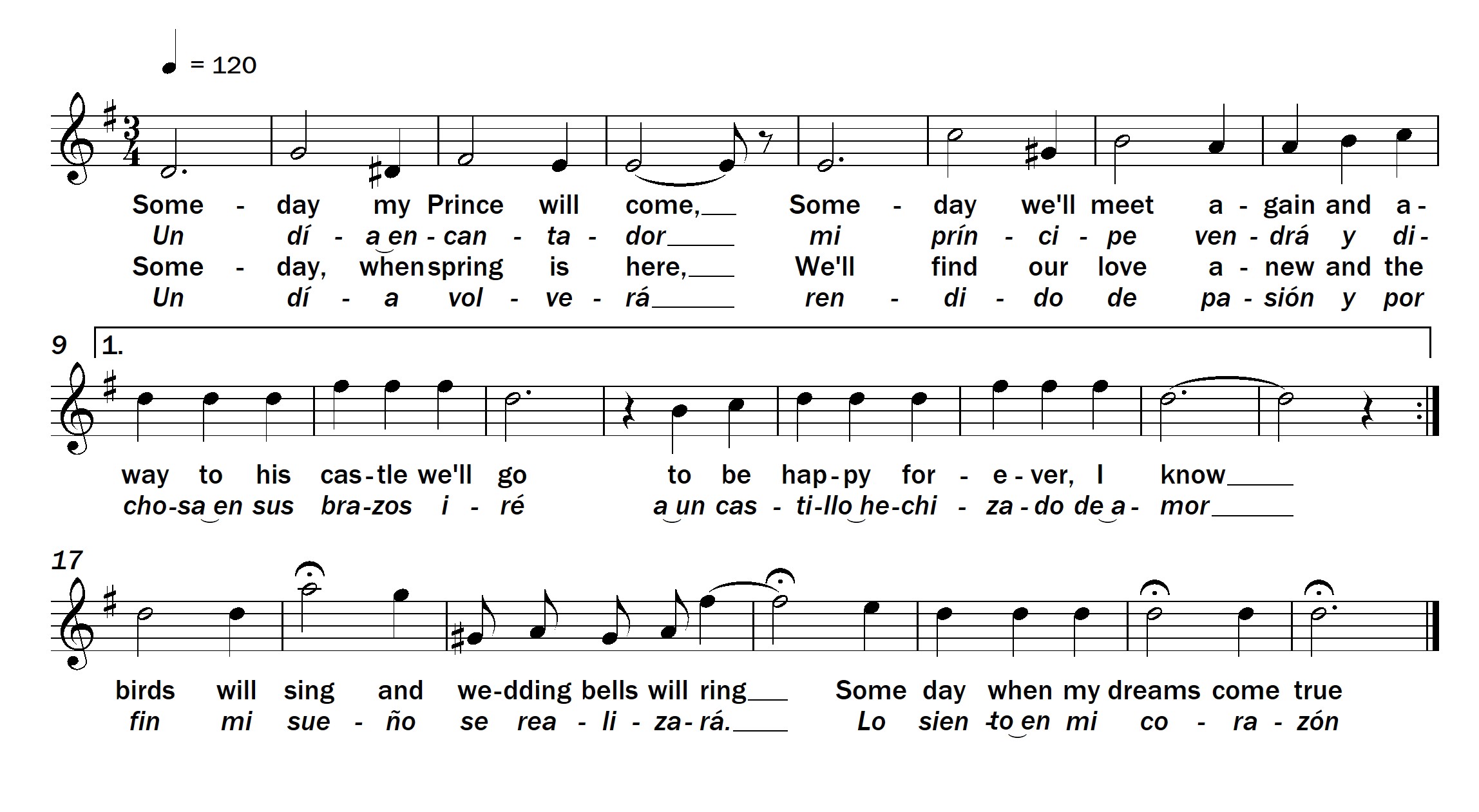Hoy les traemos comentarios interesantes acerca de una de las canciones que más ha trascendido en la historia de Disney: Mi Príncipe Vendrá, de la película Blancanieves y los Siete Enanitos. Estamos seguros que los amantes del cine de animación encontrarán muchos datos curiosos en este post.
Today we bring you interesting comments about one of the most transcendent songs in Disney history: Someday my Prince Will Come , from the movie Snow White and the Seven Dwarfs . We are sure that lovers of animated cinema will find many curious facts in this post.
Blancanieves y los Siete Enanitos fue estrenada en 1937, era la primera obra de larga duración de los estudios de Walt Disney para la Gran Pantalla, y se convirtió en un modelo obligatorio para cualquier producción animada posterior.
Snow White and the Seven Dwarfs was released in 1937, it was the first full-length play by Walt Disney Studios for the Big Screen, and it became a must-have model for any subsequent animated production.
El filme fue bien valorado por muchos años: a principios de la década de los 40, esta película había recaudado más de seis millones y medio de dólares en todo el mundo (casi cinco veces su coste de producción), y ya por aquellos años el inmenso merchandising –muñecas, tiras cómicas, sombreros, efigies de los enanos, etc.- garantizaba su mayor difusión. La que se convertiría en su pieza musical más icónica, Mi príncipe vendrá (con letra de Larry Morey y música de Frank Churchill), sería interpretada por artistas como Dave Brubeck (1957), Bill Evans (1959), Miles Davis (1961) y Etta Jones (1963), cada uno aportando su propia versión de la canción.
The film was well valued for many years: in the early 1940s, this film had grossed over six and a half million dollars worldwide (almost five times its cost of production), and by that time the huge merchandising - dolls, comic strips, hats, effigies of the dwarves, etc. - guaranteed its widest circulation. What would become its most iconic piece of music, Someday My Prince Will Come (with lyrics by Larry Morey and music by Frank Churchill), would be performed by artists such as Dave Brubeck (1957), Bill Evans (1959), Miles Davis (1961) and Etta Jones (1963), each contributing their own version of the song

(1937, Walt Disney Studios). Snow White and the Seven Dwarfs [58’14’’].
La historia de una canción | The story of a song
En Blancanieves y los Siete Enanitos, la inocente princesa es separada del Príncipe Azul por los crueles planes de su madrastra, la Reina Grimhilde, de quien Blancanieves huye perdiéndose en un bosque. Después de ser acogida por siete enanos mineros, comienza una cándida convivencia llena de amor y juegos. En uno de los momentos más emotivos de la película, Blancanieves les explica por medio del canto a los enanos que lo que más anhela, dentro de toda esta pesadilla que está padeciendo, es reencontrarse con su Príncipe; Mi príncipe vendrá logró conmover tanto a los animales del bosque como la gran mayoría de los enanos (y al público). El impacto de esta canción se hizo sentir pocos años después del estreno de la película: se dice que en 1943 fue interpretada por cautivos en un campo de concentración nazi localizado en Terezín, República Checa, en plena guerra mundial.
In Snow White and the Seven Dwarfs, the innocent princess is separated from The Prince by the cruel plans of her stepmother, Queen Grimhilde, from whom Snow White flees, losing herself in a forest. After being welcomed by seven mining dwarves, a candid coexistence full of love and games begins. In one of the most emotional moments of the film, Snow White explains to the dwarfs by singing what she most desires for, within all this nightmare she is suffering, which is to reunite with her Prince; Someday my Prince will Come managed to move both forest animals and the vast majority of dwarfs (and the public). The impact of this song was already felt a few years after the film's premiere: it is said that in 1943 it was performed by captives in a Nazi concentration camp located in Terezín, Czech Republic, during the second world war.
Un referente musical | A musical reference
Podríamos reconocer en la musicalización de Churchill una influencia de la ópera italiana, en la que usualmente se reservaban las arias para momentos de reflexión y expresividad –y en las que los cantantes lucen sus dotes interpretativos-, pues Mi príncipe vendrá reúne características similares al aria (voz solista con acompañamiento orquestal, melodías de clara concepción lírica, etc.) y cumple una clara función narrativa dentro de la obra a la que pertenece: la de situar al espectador dentro del ambiente emocional de uno de los protagonistas del drama (no una ópera, sino un filme).
Since Someday My Prince Will Come share some features of many opera’s aria (solo voice with orchestral accompaniment, melodies with a clear lyrical conception, etc.), we could recognize in Churchill's musicalization an influence of Italian opera, in which arias were usually reserved for moments of reflection and expressiveness -and in which the singers show off their interpretive skills-. This song also fulfills a clear narrative function within the work to which it belongs: that of locating the audience within the emotional environment of one of the protagonists of the drama (not a opera, but a film).

L. Morey (letra); F. Churchill (música). Someday my Prince will come (Mi príncipe vendrá). Transcripción propia; en cursiva, la letra en el doblaje castellano. | L. Morey (lyrics); F. Churchill (music). Someday my Prince will come. Own transcription; in italics, the letter in the Latin American Spanish dubbing.
Otro detalle musical importante de Mi príncipe vendrá y las canciones de princesas posteriores es la preferencia por voces ligeras de soprano, así como el aprovechamiento de la tesitura aguda de la cantante –en un punto de la canción, la melodía llega a reposar en la nota A5-. Adriana Caselotti sería la escogida para dar voz a Blancanieves gracias a su timbre “lleno de ingenuidad, gentileza y compasión” –declaraciones recogidas del diario The Independent-, adecuado para transmitir la inocencia de la primera princesa de Disney.
Another important musical detail of Someday my prince will come and some later princesses songs is the preference for light soprano voices, as well as the use of higher notes of the vocal range - at one point in the song, the melody rests on the note A5-. Adriana Caselotti was chosen to play Snow White’s role thanks to her timbre “full of naivete, gentleness and compassion” - statements from The Independent newspaper -, suitable to convey the innocence of the first Disney princess.
Así como constatan las múltiples versiones publicadas de esta canción, la música trascendió su función inicial para conocer otros contextos y cobrar fuerza por sí misma, separada de la imagen. Además, Mi príncipe vendrá se convirtió en referente para todas las canciones de princesas de posteriores producciones –como La Cenicienta (1950) y La Bella Durmiente (1959)-, ganándose incluso la parodia de filmes como Shrek (2001) o Encantada (2007).
Just as the multiple published versions of this song confirm, the music transcended its initial function in order to reach other contexts and gain strength by itself, separate from the image. In addition, Someday my prince became a benchmark for all princess songs from later productions - such as Cinderella (1950) and Sleeping Beauty -, even earning a parody of films such as Shrek (2001) or Enchanted (2007).
Hasta aquí llega nuestro primer comentario de esta canción. Para despedirnos, les dejamos un link de Mi príncipe vendrá interpretado por Abraham Urdaneta al piano. Síganos en nuestra nueva cuenta de Dsound. Que lo disfruten:
Here ends our first comment of this song. To finish, we share with you a link of Someday my Prince Will Come performed by Abraham Urdaneta on piano. Follow us on our new Dsound account. Enjoy it:
https://dsound.io/@archivero/20200422t232105435z-someday-my-prince-will-come-les-musicien
Referencias | References
